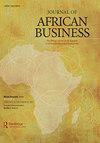市场导向会导致公司业绩吗?探索机制和边界条件
IF 1.8
Q3 BUSINESS
引用次数: 0
摘要
本研究探讨了促进企业市场导向(MO)向企业市场绩效(PERF)有效转化的机制和边界条件。我们考察了MO如何通过企业的新产品开发能力(NPDC)直接和间接影响绩效。我们还通过企业的NPDC考察了社会资本(SC)对MO-PERF关系的间接条件效应。该研究使用了来自加纳中小企业(SMEs)的313名经理和所有者的数据。采用SPSS 23.0中的条件过程分析软件process对数据进行分析。结果表明,MO对PERF有显著影响。此外,NPDC在MO和PERF之间的关系中起到部分中介作用。我们还发现,在较高的SC水平下,MO和PERF之间的间接关系逐渐减弱。该研究通过引入NPDC和SC,澄清了MO对绩效影响的不同观点。本文章由计算机程序翻译,如有差异,请以英文原文为准。
Does Market Orientation Lead to Firm Performance? Exploring the Mechanisms and Boundary Conditions
This study explores the mechanisms and boundary conditions that will enhance the effective transformation of the firm’s market orientation (MO) into firm market performance (PERF). We examined how MO influences PERF directly and indirectly through the firm’s new product development capability (NPDC). We also examined the indirect conditional effect of social capital (SC) on the MO-PERF relationship through the NPDC of the firm. Data from 313 managers and owners of small and medium enterprises (SMEs) in Ghana was used for the study. Data were analyzed using the conditional process analysis software PROCESS in SPSS 23.0. Findings indicate that MO has a significant influence on PERF. Further, NPDC partially mediates the relationship between MO and PERF. We also found the indirect relationship between MO and PERF to be declining at higher levels of SC. The study clarifies the divergent views of the impact of MO on performance by introducing NPDC and SC in the relationship.
求助全文
通过发布文献求助,成功后即可免费获取论文全文。
去求助
来源期刊

Journal of African Business
BUSINESS-
CiteScore
4.60
自引率
10.50%
发文量
36
期刊介绍:
Journal of African Business is the official journal of the Academy of African Business and Development, the largest network of professionals committed to advancement of business development in African nations. JAB strives to comprehensively cover all business disciplines by publishing high quality analytical, conceptual, and empirical articles that demonstrate a substantial contribution to the broad domain of African business. Regardless of the research context, tradition, approach, or philosophy, manuscripts submitted to JAB must demonstrate that the topics investigated are important to the understanding of business practices and the advancement of business knowledge in or with Africa. Particularly, JAB welcomes qualitative and quantitative research papers. JAB is not, however, limited to African-based empirical studies. It searches for various contributions, including those based on countries outside Africa that address issues relevant to African business. Targeted toward academics, policymakers, consultants, and executives, JAB features the latest theoretical developments and cutting-edge research that challenge established beliefs and paradigms and offer alternative ways to cope with the endless change in the business world. Covered areas: Accounting; Agribusiness Management and Policy; Business Law; Economics and Development Policy; Entrepreneurship and Family Business; Finance; Global Business; Human Resource Management; Information and Communications Technology (ICT); Labor Relations; Marketing; Management Information Systems (MIS); Non-Profit Management; Operations and Supply Chain Management; Organizational Behavior and Theory; Organizational Development; Service Management; Small Business Management; Social Responsibility and Ethics; Strategic Management Policy; Technology and Innovation Management; Tourism and Hospitality Management; Transportation and Logistics
 求助内容:
求助内容: 应助结果提醒方式:
应助结果提醒方式:


